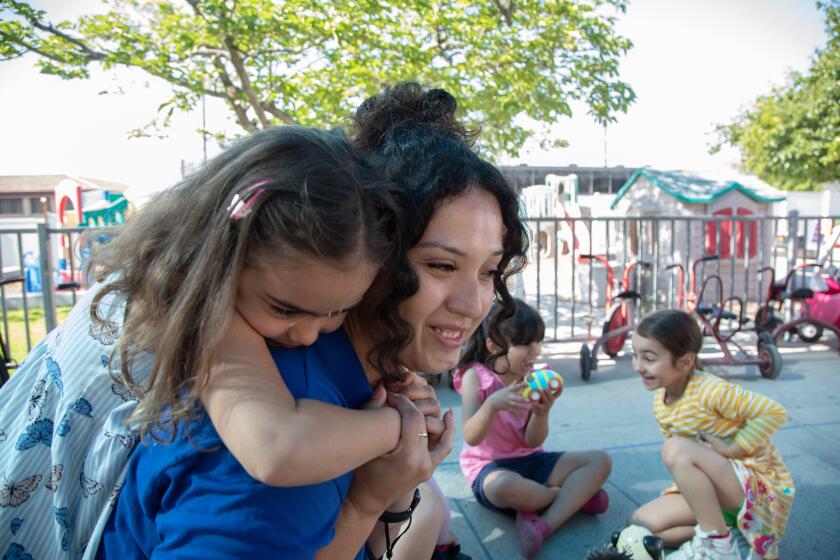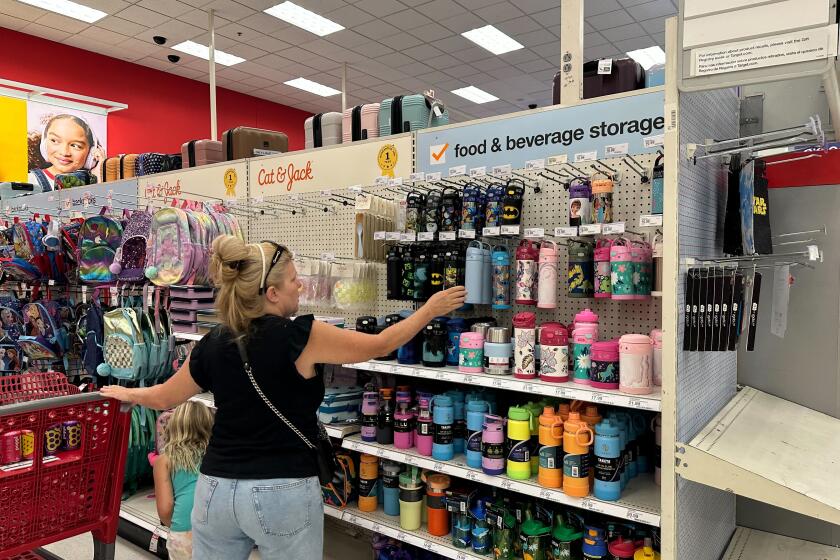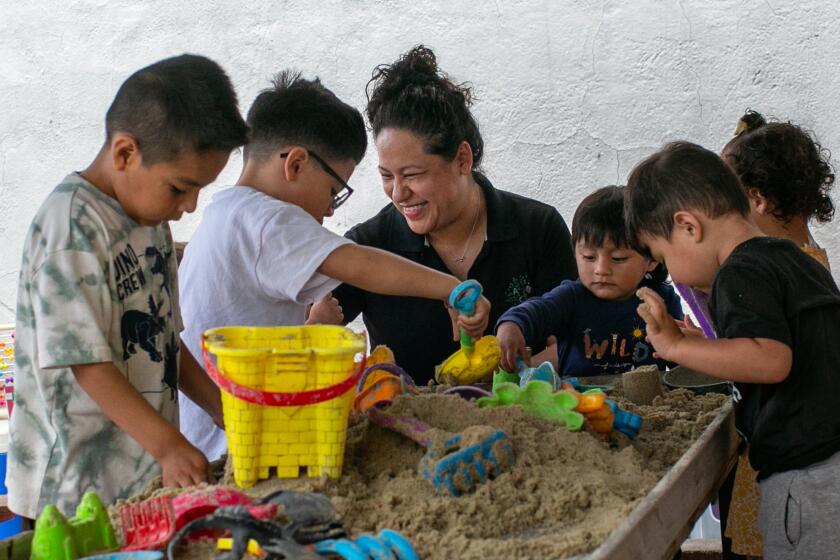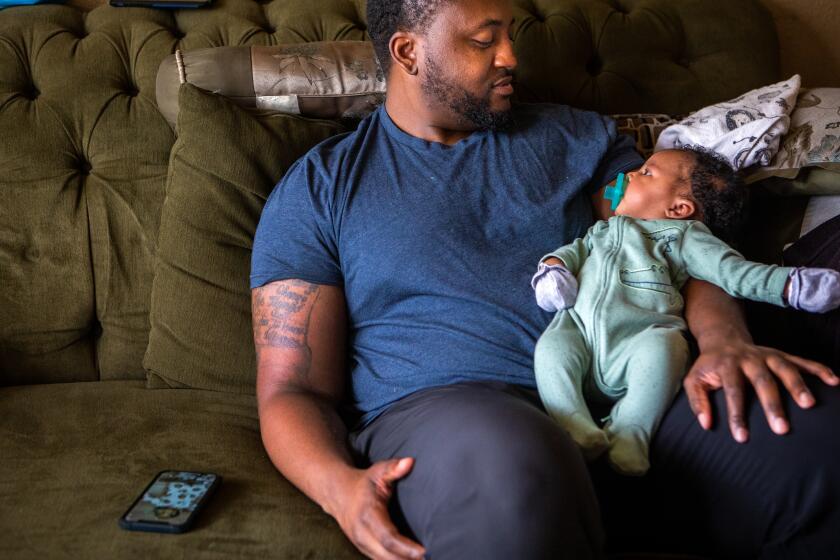Potty training, ‘accidents,’ wiping issues complicate 4-year-olds’ start at public schools
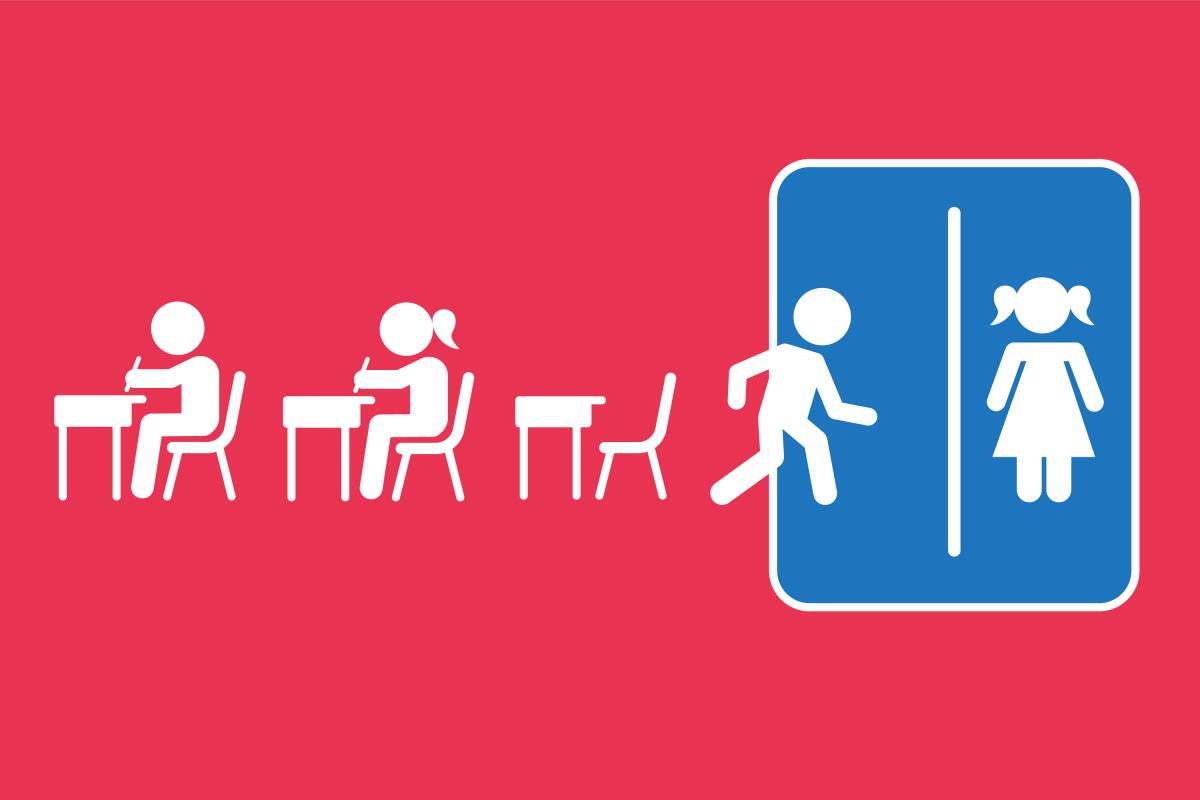
- Share via
With just weeks left to prepare her 4-year-old son for his first day in public school, Andrea Gallegos still has a few things to check off on her to-do list. Buy him a new backpack. Wean him off his daily nap. And achieve a major developmental milestone — using the toilet completely on his own.
Her son has been out of diapers for nearly two years. But in preschool, the teachers would supervise him in the bathroom, help him wipe if he needed assistance, remind him to wash his hands, and change his clothing after the occasional accident. When he starts transitional kindergarten in Lakeside, a suburb of San Diego, he’ll have to manage everything on his own.
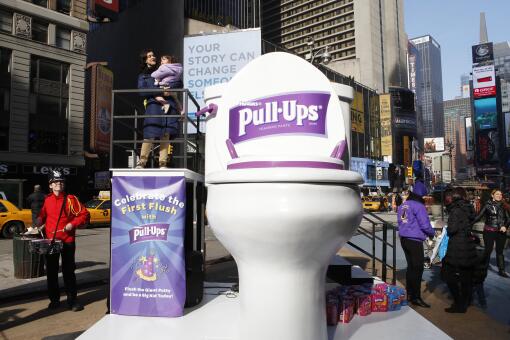
So Gallegos is acting as coach — talking her son patiently through the steps of how to use the bathroom alone, joining a sensitive but crucial parenting ritual as thousands of families prepare the state’s youngest learners for their first days in a public school classroom.
Potty training — once primarily the purview of parents and child-care programs — is increasingly becoming an issue for public school districts. As part of the state’s expansion requiring elementary schools to add a new grade level, transitional kindergarten, campuses are enrolling more 4-year-olds. The children arrive at varying stages of development: Some are ready to go the toilet on their own, others have trouble wiping, and a few come in pull-ups. And many districts are grappling with how to handle this most basic need.
The California Department of Education received so many questions on toilet training last year they clarified their policy: Schools must admit all age-eligible children, regardless of whether they are potty-trained. But the state does not give specific guidance on what supports districts should provide. The result is a mishmash of policies across districts that parents often learn only when they show up for the first day of school.
As transitional kindergarten expands across the state, California’s child-care industry is left scrambling to fill empty spots they once depended on.
Children with special needs can receive toilet assistance as part of an individualized education program. But generally, schools have not provided assistance to children without special needs, in part because of concerns about child abuse, said Gabriela Torres, an attorney with Disability Rights California.
The California Teachers Assn. recommends that the issue be bargained into teachers union contracts. A spokesperson for the Department of Education said school districts may need to renegotiate with labor unions to meet the needs of more children who aren’t fully potty-trained.
For 4-year-olds enrolled in a licensed child-care facility, California’s health and safety code is clear. Staff are required to change diapers, help with using the toilet and always supervise the child visually, even in the bathroom. But when those same 4-year-olds attend public school transitional kindergarten, commonly called TK, those rules don’t apply. Instead, each district sets its own guidelines.
At Los Angeles Unified, the district said that TK teachers will provide numerous bathroom breaks and that aides will be available to “support” children if they have an accident. At San Diego Unified, an online FAQ previously said students must be potty-trained. The FAQ has been updated, saying the state requires the district to admit non-potty-trained students — and the district offers excused absences in consecutive 10-day spans to learn at home.
At Montebello Unified, students still in diapers are sent to the office, where the nurse or health aide will change them. And at Las Virgenes Unified, enrolling families are referred to an online potty training FAQ complete with resources and recommendations, along with notice that they’ll have to pick their up child from school in the event of an accident involving a bowel movement.
As back-to-school shopping is forecast to reach a record $41.5 billion this year, parents and teachers in L.A. debate what’s essential on their lists — and get creative to make ends meet.
All districts strongly urge parents to make sure their children are potty-trained before school begins.
The problem is that the traditional K-12 system is often ill-prepared to handle the needs of very young children, said Cheri Doria, director of the early education program at Lindsay Unified School District in the Central Valley.
“All the state has done is move our 4-year-old preschoolers into the school system. TK is preschool,” Doria said. “It’s not that the kids need to adjust to the school system. The school systems needs to adjust to the learners.”
But it’s not just the youngest learners who need assistance. The state has also received questions about toilet issues all the way up through the third grade, said Shanna Birkholz-Vasquez, an Education Department official who handles TK issues and support.
“Students have returned from the pandemic with varying needs and trauma, and we know that trauma has an impact on toileting regressions,” she said.
The department currently has a team working on a set of developmentally appropriate recommendations on how school districts can support children with their most delicate needs.
Still, for TK teachers in particular, toilet issues can present a near-daily predicament.
As child-care workers struggle to pay bills, in-home providers push for higher wages and urge the state to overhaul rates for its subsidized care program.
When teachers are considering a shift to TK, “it’s the first thing they ask,” said Gennie Gorback, former president of the California Kindergarten Assn., a membership organization for early childhood educators. “It’s not, ‘How can we be developmentally appropriate or support the emotional learning of younger learners?’ It’s, ‘What if they need help with the bathroom?’”
“This is definitely something we’re concerned about,” said Micaela Moreno, a TK teacher at Long Beach Unified. “We should not be with kids alone in a room, and especially not a bathroom.”
Moreno said she tries to teach her students the basics of using the toilet, and even offers step-by-step tips through a closed bathroom door — telling them to rip off a piece of toilet paper, wash their hands and throw the paper towel in the trash can.
But she doesn’t help them wipe.
“I had kids last year that would cry every time they needed to go to the bathroom, and they said, ‘I need help wiping!’ And it broke my heart,” she said. “We were not trained to wipe children. It shouldn’t be part of my job.”
Her TK students share a single-stall bathroom with 54 students, and accidents are a frequent problem. Students are all asked to bring an extra set of clothes, and are sent to the office to change if they don’t make it to the toilet in time. If the accident is too serious to be handled at school, Moreno said, the parents are called.
Last year, Moreno said a new problem emerged. Two students showed up the first day in pull-ups. Moreno said the school did not provide diapering assistance. Instead, she had an aide walk the children to the office when a pull-up became too full, where she said the parents were called to assist. “Sometimes they’re sitting in there for 30 minutes, 45 minutes. It’s very sad.”
Cindy Young, who directs Long Beach Unified’s early childhood program, said it is rare for TK students to be in diapers. Still, the district is adapting to increasing needs. This year, they’ve added toilet assistance to the job descriptions of the aides who work in every TK classroom. The district created a training video to teach best practices.
But such accommodations are not the norm throughout the state. In her Palos Verdes Peninsula classroom, for example, TK aide Michelle Hines says, children are expected to be completely self-sufficient. When a child has an accident, they are handed a new set of clothing and sent to the bathroom to clean up on on their own.
“If it’s ugly and messy — and sometimes it is — they still have to deal with it themselves,” she said. “Sometimes they come out and their pants or their shirt are on backwards, but we go with it.” At the beginning of the year, when children are still getting used to school, a child might have several accidents a day.
Fathers play a crucial role in successful breastfeeding and safe sleep. But few follow all of the sleeping guidelines set out by the American Academy of Pediatrics.
But expecting children to clean themselves after a serious accident is simply not developmentally appropriate, pediatric specialists say. Many 4-year-olds may not even be physically able to wipe themselves, said Quiara Smith, a pediatric occupational therapist in Santa Rosa, Calif., who specializes in pelvic health.
“Four is too young to expect independence and thoroughness 100% of the time. That’s not realistic,” she said. “They’re still learning where their body is in space, and their arms are too short to necessarily get all the way around and rotate their body in order to wipe themselves thoroughly.”
When children do not wipe adequately on their own, Smith said, the consequences can be serious — urinary tract infections, rashes that lead to skin breakdown, spreading of germs when they don’t wash their hands adequately, and shame. “Other kids will ask, why do you smell? It affects their self-esteem and lowers their confidence,” she said. Often, children try to withhold until they get home from school, which can cause additional medical problems.
Smith recommends that parents begin teaching their children about toilet hygiene as early as possible, even describing the wiping process during diaper changes. “The language you use is important — ‘I’m going to keep your body clean so it doesn’t get sick,’” she said. As children get older, she advises parents to show them how to wipe other objects, such as the counter, before gradually teaching them how to wipe their bodies.
Andrea Gallegos has her own approach, honed last year when her older son was in TK — fiber for dinner, yogurt for breakfast and hope that their bodies adjust to using the bathroom before school. And in case her wiping training doesn’t work in time, she’s ready with a backup plan: a nice long shower after the school day is done.
This article is part of The Times’ early childhood education initiative, focusing on the learning and development of California children, from birth to age 5. For more information about the initiative and its philanthropic funders, go to latimes.com/earlyed.
More to Read
Sign up for Essential California
The most important California stories and recommendations in your inbox every morning.
You may occasionally receive promotional content from the Los Angeles Times.
